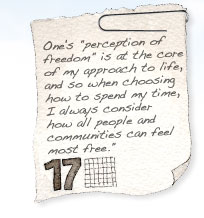Education for leisure can play an important role in reducing recidivism and addiction relapse, providing very significant benefits in the context of correctional facilities, the parole system and prisoner re-entry into society.
Problematic use of leisure time is one of the eight main factors that contribute to recidivism. People in the prison population typically lack basic critical skills that are essential for satisfying leisure time and a fulfilling life. Almost all of these individuals will return to society. Equipping them with the ability to make more positive use of their leisure time is a holistic approach that helps empower the whole person, reduce the negative use of leisure and contribute to reducing recidivism.
The Leisure Link's work with residents in correctional facilities, and in half-way houses for re-entering prisoners can help offenders and the communities to which they are returning, by:
- Developing specific skills that many people with criminal records lack, such as cooperation and teamwork, self-control in competitive situations, and a sense of fair play
- Familiarizing inmates with leisure pursuits that are socially acceptable and that satisfy their needs so that they can identify interests and realize that they can have enjoyable substance free leisure
- Providing a framework for thinking about choice and control in
leisure, which helps residents increase their sense of autonomy, and of
responsibility for their actions
Helping recovering drug addicts make conscious decisions about how to use the time formerly consumed by the addiction
Different segments of the prison population have different requirements
for leisure education. Those with limited education may need a
comprehensive program, which others may need guidance in handling their
free time within the restrictions of a confined correctional facility
environment.
Young adults-the majority of the prison population-may need to really
consider their attitudes towards specific activities that don't appear to
offer the cool, speed or thrill they are seeking. Older adults have
different issues around leisure and re-entry.
Properly tailored programs, including group coaching, lectures, hands-on
activities (where possible) and "leisure buddy" programs, as
well as guidance on the design and layout of leisure and recreational
space, can offer benefits to each of these segments.
"I have learned first hand that some
people feel free while behind bars, yet others feel "locked up"
while living in society. One's "perception of freedom" is
at the core of my approach to life, and so when choosing how to spend my
time, I always consider how all people and communities can feel most
free" ~ Alison Link
Learn how services from The Leisure Link can build
healthy communities.
See
relevant TLL case studies.
See
references on leisure education and recidivism.
See
references on leisure education and substance abuse.











